21. Hacking Secret Ciphers with Python by Al Sweigart
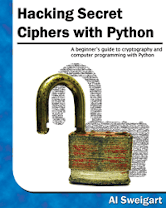 Hacking Secret Ciphers with Python teaches complete beginners how to write cipher programs and hacking programs that can break encrypted messages from these ciphers, using Python programming language.
Hacking Secret Ciphers with Python teaches complete beginners how to write cipher programs and hacking programs that can break encrypted messages from these ciphers, using Python programming language.
The book features the source code to several ciphers and hacking programs for these ciphers. The programs include the Caesar cipher, transposition cipher, simple substitution cipher, multiplicative & affine ciphers, Vigenere cipher, and hacking programs for each of these ciphers. The final chapters cover the modern RSA cipher and public key cryptography.
Hacking Secret Ciphers with Python is licensed under a Creative Commons Attribution-Noncommercial-Share Alike 3.0 United States License.
22. The Definitive Guide to Pylons by James Gardner
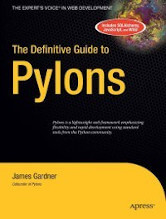 Pylons is a lightweight web framework built on standard Python tools that provides a robust environment for writing modern web applications. It’s well known for its clean architecture and loosely coupled approach, both of which make web development fast, flexible, and easy.
Pylons is a lightweight web framework built on standard Python tools that provides a robust environment for writing modern web applications. It’s well known for its clean architecture and loosely coupled approach, both of which make web development fast, flexible, and easy.
The Definitive Guide to Pylons teaches you everything you need to know about web development with Pylons – from how to create your first “Hello World!” application to how to use each of Pylons’ core tools including FormEncode, Mako, SQLAlchemy, and Routes to how to perform more advanced tasks such as testing, using Unicode, internationalizing your application, authenticating users, and more.
It also helps developers make use of the software’s built-in support for session management, web services, and Ajax.
This book is made available under the terms of the GNU Free Documentation License, Version 1.2 or any later version.
23. Intermediate Python by Muhammad Yasoob
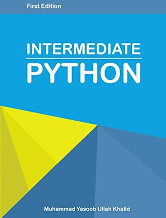 The topics which are discussed in this book open up your mind towards some nice corners of Python language.
The topics which are discussed in this book open up your mind towards some nice corners of Python language.
This book is an outcome of the author’s desire to have something like this when he was beginning to learn Python. If you’re a beginner, intermediate or even an advanced programmer there is something for you in this book.
This book is not a tutorial and does not teach you Python. The topics are not explained in depth, instead only the bare minimum required information is given.
This book is released under the Creative Commons license (CC BY-NC-SA 4.0).
24. From Python to Numpy by Nicolas P. Rougier
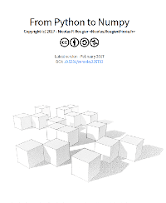 From Python to Numpy offers a different approach focusing on the migration from Python to NumPy through vectorization. The book explains some of the techniques. You need an intermediate level in Python and a beginner level in NumPy.
From Python to Numpy offers a different approach focusing on the migration from Python to NumPy through vectorization. The book explains some of the techniques. You need an intermediate level in Python and a beginner level in NumPy.
NumPy is the fundamental package for scientific computing with Python.
This book is licensed under a Creative Commons Attribution-Non Commercial-Share Alike 4.0 International License.
25. Clean Architectures in Python by Leonardo Giordani
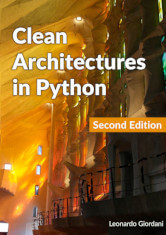 This book is about a software design methodology. A methodology is a set of guidelines that help you to reach your goal effectively, thus saving time, implementing far-sighted solutions, and avoiding the need to reinvent the wheel time and again.
This book is about a software design methodology. A methodology is a set of guidelines that help you to reach your goal effectively, thus saving time, implementing far-sighted solutions, and avoiding the need to reinvent the wheel time and again.
As other professionals around the world face problems and try to solve them, some of them, having discovered a good way to solve a problem, decide to share their experience, usually in the form of a “best practices” post on a blog, or talk at a conference. The author also speaks of patterns, which are formalised best practices, and anti-patterns, when it comes to advice about what not to do and why it is better to avoid a certain solution.
Next page: Page 6 – Learn Python, Break Python and more books
Pages in this article:
Page 1 – Think Python and more books
Page 2 – Supporting Python 3 and more books
Page 3 – Invent Your Own Computer Games with Python and more books
Page 4 – Making Games with Python & Pygame and more books
Page 5 – Hacking Secret Ciphers with Python and more books
Page 6 – Learn Python, Break Python and more books
Page 7 – Modeling Creativity: Case Studies in Python and more books
Page 8 – Python in Hydrology and more books
Page 9 – Tiny Python 3.6 Notebook and more books
All books in this series:
| Free Programming Books | |
|---|---|
| Ada | ALGOL-like programming language, extended from Pascal and other languages |
| Agda | Dependently typed functional language based on intuitionistic Type Theory |
| Arduino | Inexpensive, flexible, open source microcontroller platform |
| Assembly | As close to writing machine code without writing in pure hexadecimal |
| Awk | Versatile language designed for pattern scanning and processing language |
| Bash | Shell and command language; popular both as a shell and a scripting language |
| BASIC | Beginner’s All-purpose Symbolic Instruction Code |
| C | General-purpose, procedural, portable, high-level language |
| C++ | General-purpose, portable, free-form, multi-paradigm language |
| C# | Combines the power and flexibility of C++ with the simplicity of Visual Basic |
| Clojure | Dialect of the Lisp programming language |
| ClojureScript | Compiler for Clojure that targets JavaScript |
| COBOL | Common Business-Oriented Language |
| CoffeeScript | Transcompiles into JavaScript inspired by Ruby, Python and Haskell |
| Coq | Dependently typed language similar to Agda, Idris, F* and others |
| Crystal | General-purpose, concurrent, multi-paradigm, object-oriented language |
| CSS | CSS (Cascading Style Sheets) specifies a web page’s appearance |
| D | General-purpose systems programming language with a C-like syntax |
| Dart | Client-optimized language for fast apps on multiple platforms |
| Dylan | Multi-paradigm language supporting functional and object-oriented coding |
| ECMAScript | Best known as the language embedded in web browsers |
| Eiffel | Object-oriented language designed by Bertrand Meyer |
| Elixir | Relatively new functional language running on the Erlang virtual machine |
| Erlang | General-purpose, concurrent, declarative, functional language |
| F# | Uses functional, imperative, and object-oriented programming methods |
| Factor | Dynamic stack-based programming language |
| Forth | Imperative stack-based programming language |
| Fortran | The first high-level language, using the first compiler |
| Go | Compiled, statically typed programming language |
| Groovy | Powerful, optionally typed and dynamic language |
| Haskell | Standardized, general-purpose, polymorphically, statically typed language |
| HTML | HyperText Markup Language |
| Icon | Wide variety of features for processing and presenting symbolic data |
| J | Array programming language based primarily on APL |
| Java | General-purpose, concurrent, class-based, object-oriented, high-level language |
| JavaScript | Interpreted, prototype-based, scripting language |
| Julia | High-level, high-performance language for technical computing |
| Kotlin | More modern version of Java |
| LabVIEW | Designed to enable domain experts to build power systems quickly |
| LaTeX | Professional document preparation system and document markup language |
| Lisp | Unique features - excellent to study programming constructs |
| Logo | Dialect of Lisp that features interactivity, modularity, extensibility |
| Lua | Designed as an embeddable scripting language |
| Markdown | Plain text formatting syntax designed to be easy-to-read and easy-to-write |
| Objective-C | Object-oriented language that adds Smalltalk-style messaging to C |
| OCaml | The main implementation of the Caml language |
| Pascal | Imperative and procedural language designed in the late 1960s |
| Perl | High-level, general-purpose, interpreted, scripting, dynamic language |
| PHP | PHP has been at the helm of the web for many years |
| PostScript | Interpreted, stack-based and Turing complete language |
| Prolog | A general purpose, declarative, logic programming language |
| PureScript | Small strongly, statically typed language compiling to JavaScript |
| Python | General-purpose, structured, powerful language |
| QML | Hierarchical declarative language for user interface layout - JSON-like syntax |
| R | De facto standard among statisticians and data analysts |
| Racket | General-purpose, object-oriented, multi-paradigm, functional language |
| Raku | Member of the Perl family of programming languages |
| Ruby | General purpose, scripting, structured, flexible, fully object-oriented language |
| Rust | Ideal for systems, embedded, and other performance critical code |
| Scala | Modern, object-functional, multi-paradigm, Java-based language |
| Scheme | A general-purpose, functional language descended from Lisp and Algol |
| Scratch | Visual programming language designed for 8-16 year-old children |
| SQL | Access and manipulate data held in a relational database management system |
| Standard ML | General-purpose functional language characterized as "Lisp with types" |
| Swift | Powerful and intuitive general-purpose programming language |
| Tcl | Dynamic language based on concepts of Lisp, C, and Unix shells |
| TeX | Markup and programming language - create professional quality typeset text |
| TypeScript | Strict syntactical superset of JavaScript adding optional static typing |
| Vala | Object-oriented language, syntactically similar to C# |
| VHDL | Hardware description language used in electronic design automation |
| VimL | Powerful scripting language of the Vim editor |
| XML | Rules for defining semantic tags describing structure ad meaning |
